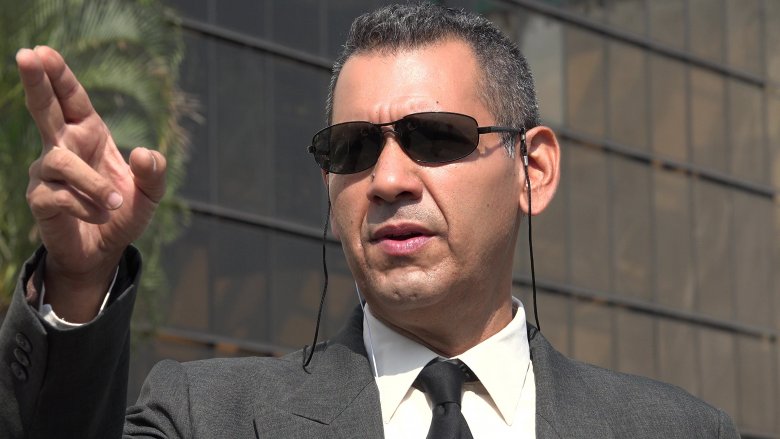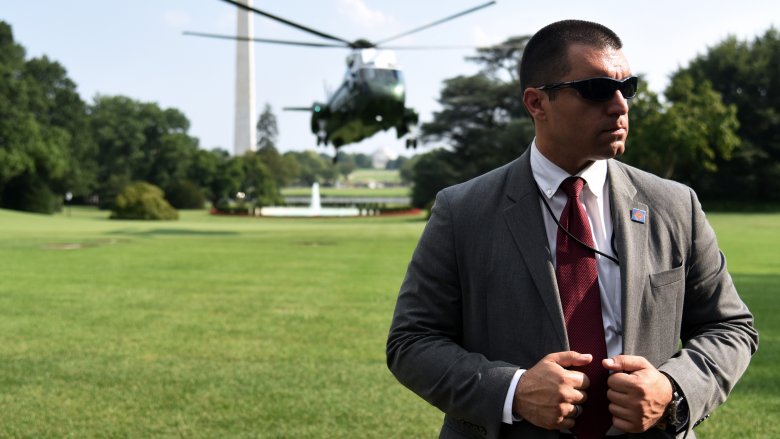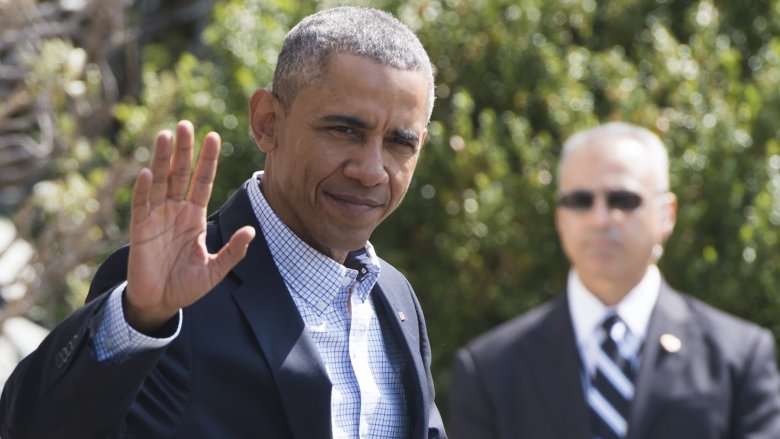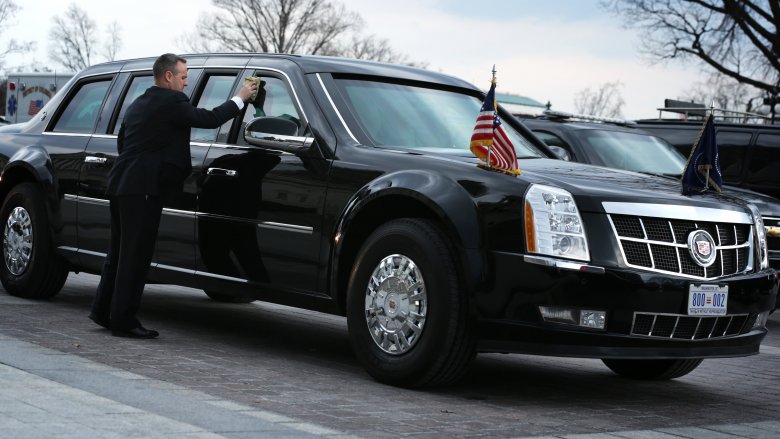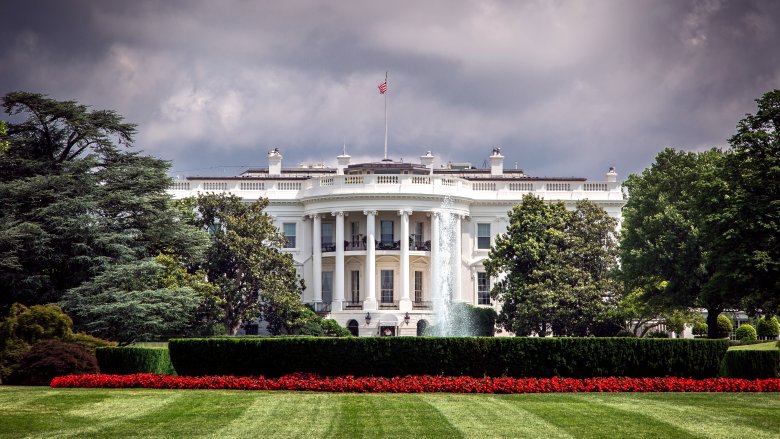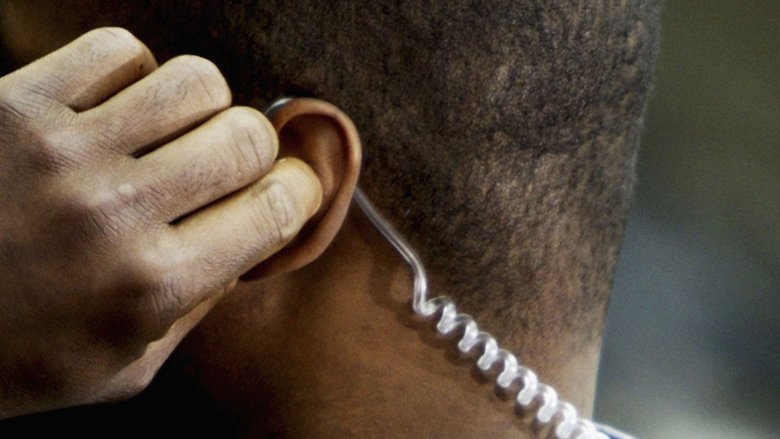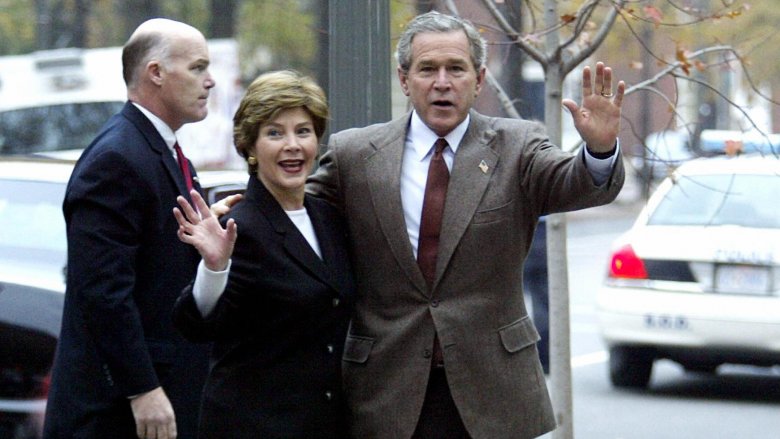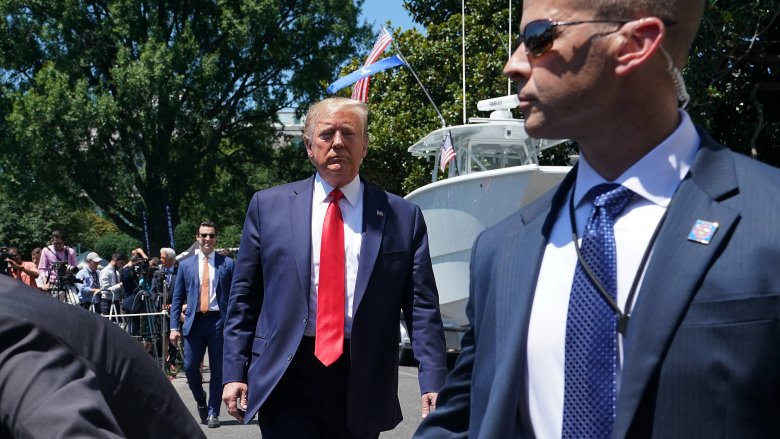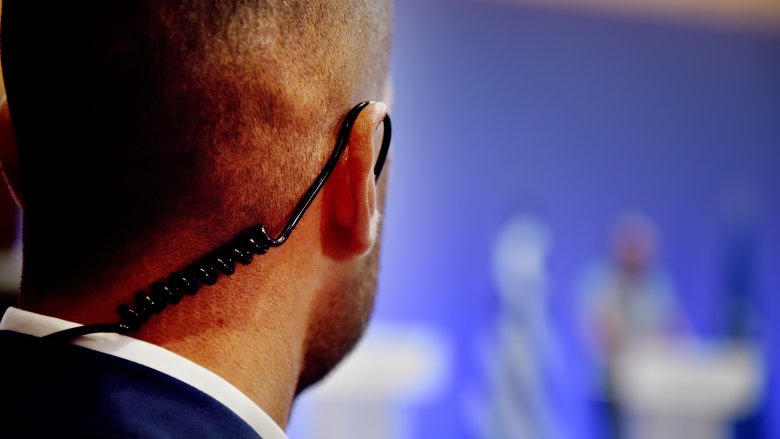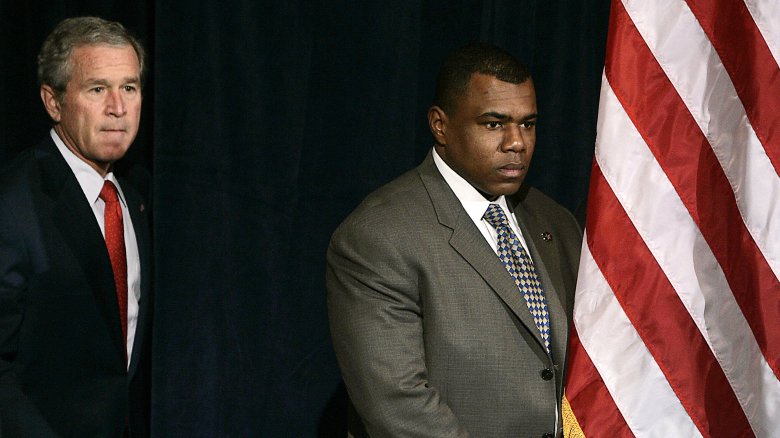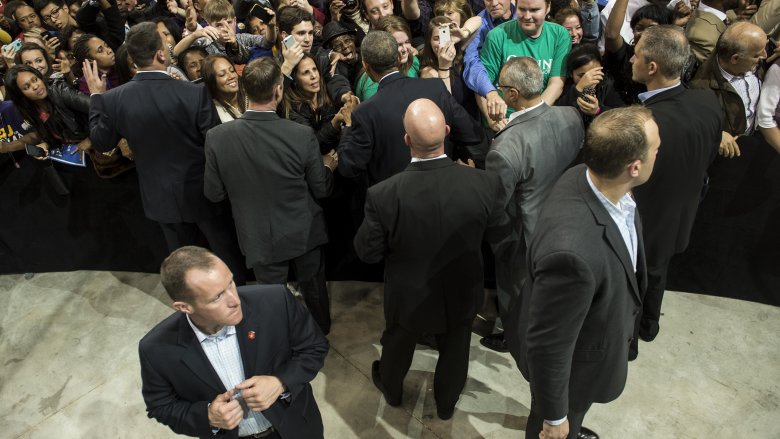False Facts About The Secret Service You Always Thought Were True
If there's one thing everyone can agree about the Secret Service, it's that they look super cool. After all, they've got the dark sunglasses, the earpieces, and the sometimes-black suits reminiscent of a certain alien-fighting, mind-erasing duo from '90s (or from the 2010s, depending on which movie is dearest to your heart). In fact, it's easy to imagine the people oozing so much cool that it's a wonder the president doesn't slip on it would be living a life of James Bond-style glamour and intrigue.
And that's just one of many false facts you probably believe about the life of a Secret Service agent.
So what's the truth about the nation's coolest job? Well, there are so many myths and misconceptions about the profession that it's probably going to be more useful if we just go straight into debunking all the false facts floating around out there. From their paychecks to their official oaths, here are the false facts about the Secret Service that you probably always assumed were true.
Secret Service agents get danger money
If your job potentially includes taking a bullet for someone, it seems like your pay ought to go up or down depending on how hated or beloved the person standing next to you is. That's not how it works, though. In fact, the paycheck of a new Secret Service hire doesn't even come close to the sort of danger money you'd think a person would make in such a profession. According to FederalLawEnforcement.org, a brand-new agent can expect to make between $38,511 and $55,413, with the potential for a moderate increase in places where the cost of living is higher. That's hardly minimum wage, but it's also not "you might die" wages, either.
To be fair, though, new agents work in investigations before they're transferred for protective detail, so those first few years don't involve a lot of danger unless you count the danger of an especially boring case. After that, your salary starts to go up, and once you're a full-performance agent, you can expect to earn between $84,000 and $106,000.
Not bad, but if you want real money, consider becoming an underwater welder, instead. Of course, the death rate for an underwater welder is at about 15 percent, and the truth is that Secret Service agents almost never get killed on the job. While 37 agents have died in the line of duty, some of those fatalities include natural causes, like suffering from a stroke or heart attack. And as of right now, only one agent has died protecting the president from assassination, and that was back in 1950. So there's real danger vs. perceived danger. In other words, while they're definitely not earning danger money, it's not terrible money, either.
They exist only to protect the president
Most Americans' exposure to the Secret Service is through television or other forms of media. They're hanging out next to the president looking cool in their black suits and dark sunglasses, ready to take that bullet if and when it comes flying. So many people assume that that's all they do — they stand next to the president, they offer up their vital organs to flying bits of lead, and they look cool.
Alas, that is not, in fact, the only thing that Secret Service agents do. Sure, Secret Service agents protect the president, but they also protect the vice president, the families of the president and vice president, the leading candidates for the presidency and the vice presidency, visiting heads of state, and other government officials considered "high-profile." But that's not all. Many Secret Service agents don't protect anyone, unless you count all those dead presidents on money as actual people.
The first job of the Secret Service — in fact, the actual reason that the Secret Service became a thing — is to protect U.S. currency. The agency was founded in 1865 as a way to combat the rampant counterfeiting of American money, and it wasn't even until 1901 that it took on the role of protecting the president. So an agent spends those first years investigating things like fraud, money laundering, and cybercrime. After that's done, they can expect to get a protective assignment.
It's a glamorous job
Just look into a Secret Service agent's eyes ... err, sunglasses ... and it's obvious they're living a life of glamour. Imagine taking on that kind of responsibility and being that uber, ultra cool. It must be a life of parties, danger, martinis (shaken, not stirred), and being mistaken for 007 all the time.
It's not, though. Nope. In fact, according to former agent Dan Emmett, Secret Service agents — particularly the ones assigned to protect the president — have a really high burnout rate. Each agent on the president's detail has to work two weeks on a day shift, two weeks on a midnight shift, followed by two weeks on an evening shift. That must be great for making sure your agents are always alert and aware of their surroundings, right? Or maybe that's why they have to wear the sunglasses, so no one can tell they're nodding off on the job.
So that sounds exhausting, but there's also the jet-setting and state visits and the many, many trips to the golf course, so that's cool, right? Sort of, but that's all balanced out by hours on Air Force One, trips to the bathroom, and trips to various types of butt doctor. That's right, the president can never be left alone, so as his protector, it's your job to stand in the same room with him while he's pooping, getting a prostate exam, or having a colonoscopy. Sound glamorous enough for you?
The Secret Service calls all the shots when it comes to security
So are the Secret Service totally in control of White House security? Well, sort of. As it turns out, like most of the world's parents, the Secret Service isn't immune to whining, and they've been known to make decisions that are based less on keeping everything super secure from intruders and would-be assassins and more on keeping themselves super secure from having to listen to everyone else complain all the time.
Do you remember that one incident in 2014 where some dude jumped the White House fence and ran right through the front door? Well, according to The Washington Post, that incident probably wouldn't have been quite so bad if the Secret Service hadn't muted an alarm box near the front entrance of the building — a box that was supposed to alert agents to the presence of an intruder. So why was the box muted? The usher's office asked them to do it, because the alarm boxes were noisy.
Security may be less-than-rigorous as a matter of practice in some other cases, as well. For example, presidential candidates don't often want their Secret Service agents to look all Secret Service-y because that can make them seem less approachable. So really, the Secret Service is expected to provide unimpeachable security, but they're also expected to not be too draconian, which sometimes means making choices that take other people's less-than-security-minded opinions into consideration. Clearly, that's one area that could use a little upgrading.
The earpieces are uncomfortable
Most people don't really understand those Secret Service earpieces. They're kind of weird, what with that 1970s telephone cord hanging down the back of the neck, making agents look simultaneously cool and also like they're using some seriously super low-tech communications devices. So what's going on with those earpieces anyway, and why are Secret Service agents forever touching the things?
It kind of seems like maybe they just find them intensely uncomfortable and are constantly trying to adjust them. Or maybe they're like a drive-through headset, and the agents have a button they have to push so they can talk to that mysterious person who's on the other end of the curly cord thingy.
Well, according to Slate, it's actually a lot simpler than that. Sometimes the agents need to fiddle with their earpieces in order to create a good seal, because a good seal is what ensures that they'll actually hear the person who's trying to convey information to them.
What about that curly wire, then? It's attached to a hidden microphone, which is sometimes placed just under the shirt sleeve. That's why you'll also see agents lifting their wrists to their mouths. It might look kind of like they're constantly wiping ketchup off their faces, but it's actually a form of communication. Yes, there's a method to all that weird fidgeting and gesturing.
The Secret Service has to protect the president's whole family for life
It's not just the current president the Secret Service has to worry about, it's also former presidents. Once you've been at the helm of America, you get to have Secret Service protection for life. And so does your whole extended family, right?
Actually, that's not precisely true. According to CBS, the adult children of a U.S. president lose their Secret Service protection as soon as their parent leaves office. And until recently, former presidents only got ten years of protection, and former vice presidents got just six months. That changed when President Obama signed an executive order requiring the Secret Service to protect former presidents and first ladies for life.
There's some wiggle room as far as family members are concerned. When Bill Clinton left office, he signed an executive order for extra protection for his daughter, Chelsea, and George W. Bush did the same thing for his daughters.
So how about the First Dog? Some people think Secret Service protection even extends to the canine member of the presidential family, but that's not true. In his book, Within Arm's Length, former agent Dan Emmett says the Secret Service is under no obligation to protect pets, though there have been a few cases where people have spotted agents walking the president's dog. So it should be noted that they don't have to do it, but that doesn't necessarily mean they won't.
The Secret Service supports the president politically
Most of us are good Samaritans at heart, and we recognize that a human being in danger always deserves to be saved. And just about everyone likes to think that they'd help someone who's in danger. But there are different levels of that. We'd throw ourselves in front of a truck to protect our kids, other relatives, and even our friends, even if we knew that the effort would probably kill us. But would we do the same thing for a stranger? How about for someone we don't even like?
That's why it's kind of hard to internalize the idea that Secret Service agents are not the president's political allies or even his friends. They're supposed to remain completely apolitical, which means they're not allowed to support him publicly, and they're not allowed to oppose him publicly, either.
Not only that, but Secret Service agents aren't even really allowed to talk to the president, or presumably anyone else they are charged with keeping safe. "How an agent deals with the president is completely a professional relationship," former agent Dan Emmett told NPR. "It is not a friendship. An agent never initiates a conversation with the president, other than to say, 'Good morning, sir.' A lot of times, the president will engage you, and if he does, then a few exchanges back and forth, and the conversation really should be over."
Crossing the Secret Service is kind of like crossing the CIA
It must be the fact that "secret" is literally part of their name, but for some reason, the whole Secret Service organization has a sort of reputation. You don't want to be a whistleblower in the Secret Service, just like you don't want to be a whistleblower in the CIA, because they have ways of dealing with whistleblowers.
Happily for freedom and democracy, none of that is true, though this myth runs so deep that there have been some instances of would-be whistleblowers who were reluctant to come forward because they were afraid management either wouldn't take them seriously or would just shut them down. That's hardly the same thing as "being taken care of," but still, you want a work environment where you aren't afraid to bring up your concerns to your bosses.
According to The Huffington Post, there were several big Secret Service-related scandals during the Obama administration, including one in which agents were out chasing prostitutes. Most of the people within the Secret Service who helped break that story did it anonymously to journalists, rather than internally to Secret Service management.
The Washington Post, though, thinks this is mostly just due to a breakdown in communication, a lack of structured disciplinary policies, and perhaps a small amount of personal conflict between management and employees. It's probably not true that whistleblowers would be silenced or even disciplined, but the perception by itself is problematic enough.
They almost never screw up
When you're charged with something as important as protecting the life of the most powerful person in America, you'd better be really well-trained. You'd better dot all your i's and cross all your t's. You'd better make sure there's never any breakdown in the process and that you follow protocol to the letter. That way, you can virtually guarantee that nothing will ever happen to the man (or woman) in the Oval Office, and you can rest easy at night.
But there's also the problem where Secret Service agents are actually human beings, so yeah, that kind of puts a damper on the whole perfection thing. According to NBC, there were a famously large number of security lapses during the Obama administration, which included that mad dash by the fence jumper, a bungled response to a shooter who managed to actually fire seven bullets into the White house, and an incident where some random armed security guard got into an elevator with President Obama. Those incidents actually led to the resignation of Secret Service Director Julia Pierson, followed by a complete review of the agency in an attempt to figure out why it was breaking down so spectacularly.
Things seem to have quieted a bit now that Donald Trump is the president, but still, it might be a while before the office of the president has the same kind of faith in the Secret Service that it used to have.
Secret Service agents work for the president
Secret Service agents protect the president, and they protect his family, but they're not his employees, which means that technically speaking, they don't answer to him. The Secret Service is actually a part of the US Department of Homeland Security. It wasn't always that way, though. Because their original mission was to investigate counterfeiting and other financial crimes, they were established as a branch of the Treasury Department, where they remained until March 2003. After September 11, 2001, the Secret Service's mission expanded to include the job of providing security at big non-political events like the Super Bowl, or basically any place that could be considered a target for terrorists. So protecting the president is actually a pretty small part of what they do.
The Secret Service doesn't get their orders from the president, but they do have to take orders from the president. In fact Jim Ronan, professor of political science at Villanova University, told Readers Digest that the president isn't actually obligated to follow the advice of the Secret Service. So in other words, if they advise the president against doing something they think will be a security risk, he can just do it anyway.
The one thing the president can't do, though, is refuse the protection of the Secret Service altogether. That's mandated by a federal statute.
They've sworn an oath to die for the president
Swearing an oath to die in the line of duty is hardly a new idea. That's basically the job description for any member of the military, U.S. or otherwise. Throughout the ages, people have laid down their lives to protect their king, their country, or even their employer.
But technically speaking, no Secret Service agent has to swear to take a bullet (or a bomb, or the business end of a katana) for the president. There's actually no oath about dying for the commander-in-chief. In fact, at least one Secret Service agent recently made news for swearing exactly the opposite. Kerry O'Grady, a senior Secret Service agent, evidently told friends and colleagues that she'd refuse take a bullet for Donald Trump, who at that point had yet to become the president-elect.
So it may not be an oath you have to take or anything, but you're definitely not allowed to actually say out loud that you don't plan to ever take a bullet for the president. O'Grady ended up resigning over her comments, though she did get to keep her federal pension.
